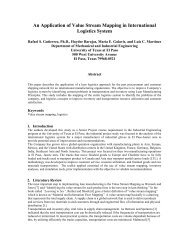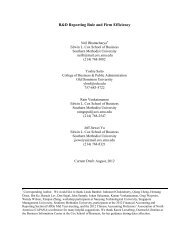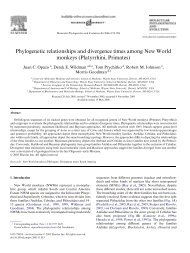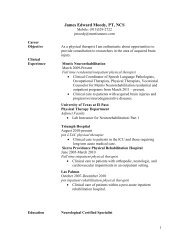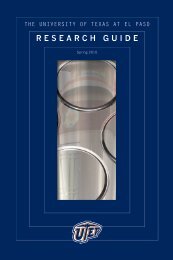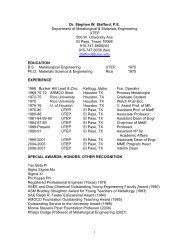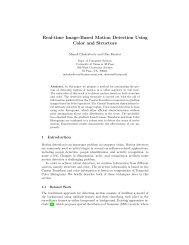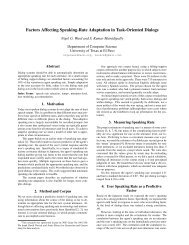research guide - UTEP Magazine - University of Texas at El Paso
research guide - UTEP Magazine - University of Texas at El Paso
research guide - UTEP Magazine - University of Texas at El Paso
Create successful ePaper yourself
Turn your PDF publications into a flip-book with our unique Google optimized e-Paper software.
C<strong>at</strong>ching Rays<br />
Light filter protects masterpieces<br />
It’s a C<strong>at</strong>ch-22 for museums: drawings,<br />
w<strong>at</strong>ercolors and other delic<strong>at</strong>e masterpieces<br />
<strong>of</strong>ten must be kept hidden away in dark storage<br />
rooms, because displaying them would expose<br />
them to damage from light.<br />
But <strong>UTEP</strong> Chemistry Pr<strong>of</strong>essor Carl W.<br />
Dirk, Ph.D., believes he’s found a way to free<br />
the precious works from their gloomy museum<br />
cells.<br />
Dirk has invented a light filter th<strong>at</strong> removes<br />
a significant amount <strong>of</strong> damaging light, without<br />
leaving p<strong>at</strong>rons in the dark.<br />
“We can actually slice out parts <strong>of</strong> the visible<br />
light spectrum th<strong>at</strong> you don’t need to see<br />
the object,” Dirk says.<br />
The invention has drawn the interest <strong>of</strong> the<br />
Getty Conserv<strong>at</strong>ion Institute, which is partnering<br />
with Dirk and the Georgia O’Keefe Museum in<br />
Santa Fe, N.M., to cre<strong>at</strong>e a special set <strong>of</strong> filters<br />
for a display <strong>of</strong> O’Keefe’s art.<br />
Dirk’s <strong>research</strong> also was highlighted <strong>at</strong> the<br />
California Science Center in Los Angeles in an<br />
exhibit titled FADE: The Dark Side <strong>of</strong> Light.<br />
“It is a special privilege for academic scientists<br />
to work on projects like this. Developing a<br />
practical solution for this lighting problem has<br />
been a high point for my career,” says Dirk.<br />
Carl W. Dirk, Ph.D.<br />
“Scientists usually work on<br />
abstract things. This is rewarding<br />
because people can understand it<br />
and appreci<strong>at</strong>e it.”<br />
Research Guide | 55



